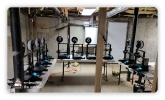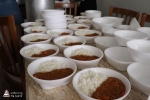After some modifications of the design based on input from the doctors using the masks, getting more 3D printers including one donated professional printer, and enlisting his local friends, AYUDH members, and family to help cut the filter squares from their homes, Vajraang’s Atlanta team could output about 50 masks per day. Nevertheless, demand quickly surpassed his ability to create and ship the kits, so Vajraang reached out to AYUDH Americas for additional help.
Within just two weeks since his team started, over 70 volunteers from across the Americas--AYUDH members, friends, family, and mentors alike--have come together to help from their own homes to make and donate over 400 masks and 6,875 filter squares. AYUDH university student chapters including those at the Yale University School of Medicine and University of Maryland School of Medicine have also mobilized, focusing the rest of their activities for the year on filter-cutting and mask-making remotely by individual members from their homes across the US in place of campus events and workshops. Tasks, many of which can be performed completely remotely, include purchasing pre-tested HEPA filter kits online, cutting up the filter kits into filter squares for the masks, sewing the elastic “scrunchie” mask straps, assembling the mask kits, delivering them or shipping them to the hospitals in need, and helping raise awareness and financial resources to sustain the project. Help is especially needed with cutting the filter squares, since a supply of those need to be sent to replenish hospitals already deploying the masks as well as within the mask kits in the new shipments of masks. Some AYUDH members with 3D printers at home have even gotten involved in helping out with the printing.
This effort comes as part of the comprehensive approach AYUDH Americas has taken to the Coronavirus Crisis. Soon into the world-wide lockdown, AYUDH Americas came together to create a national hotline that provides grocery services to those in need. The hotline also serves as a calling center to help individuals navigate technology and the new day-to-day during these trying times -- offering tutoring sessions, lessons in how to use zoom, and more. The team involves volunteers from around the country. Beyond that, chapters have been innovating to help their local communities in any way they can. The brazil AYUDH chapter prepared multiple essential need kits for children facing troubles in this time of crisis; the DC chapter has begun an online zoom class that teaches members how to be creative with cultivating gardens during this time; lastly, the chapters all pledged to maintain social distancing measures until it is safe to stop.









